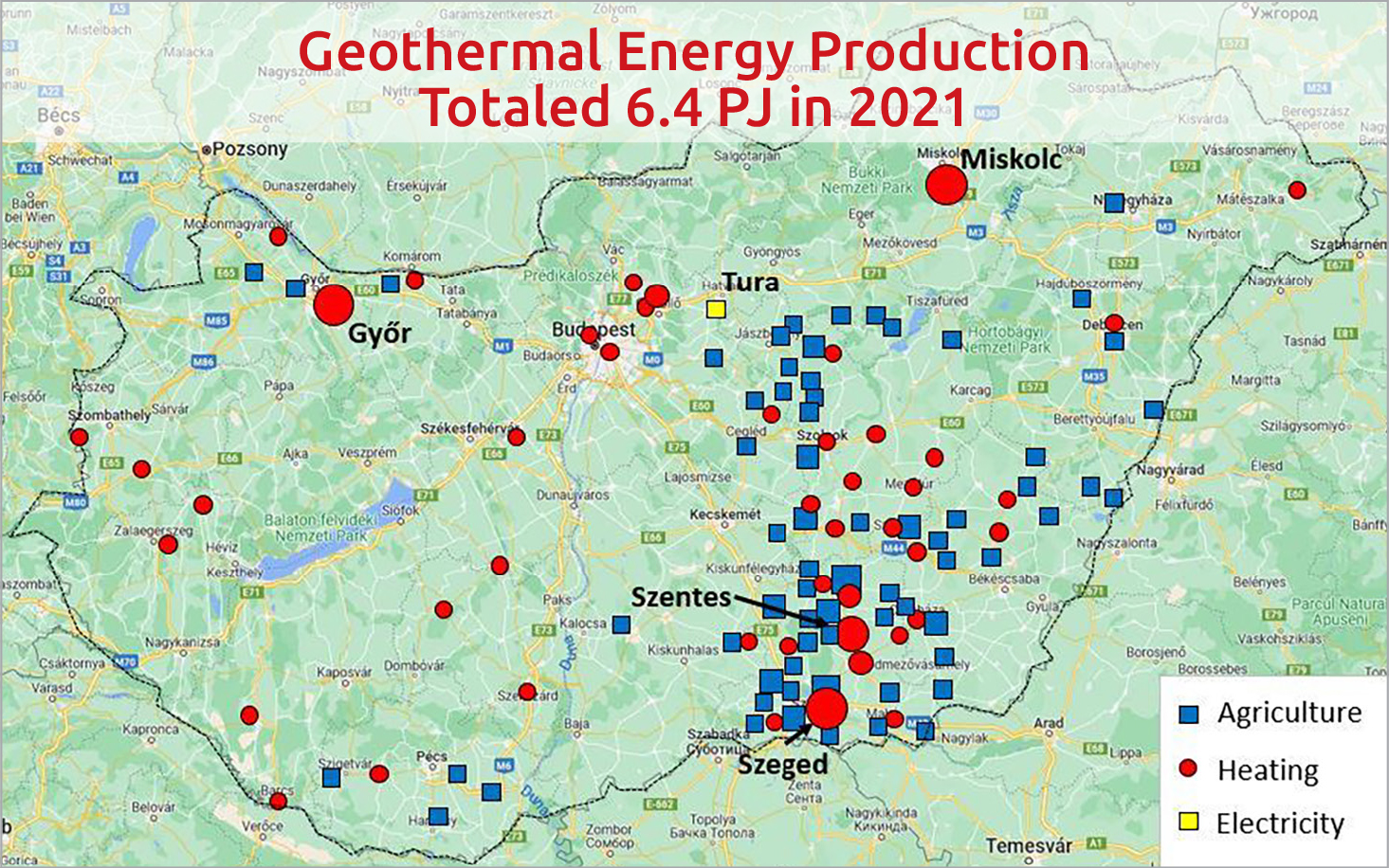Government Seeking to Exploit Hungary’s Geothermal Energy Potential

Hungary is sitting on, but failing to properly utilize, thermal waters laying below the earth’s surface; new legislation and investment incentives are set to change this.
Hungary is a “superpower” in terms of its geothermal energy, but it has so far largely failed to harness its possibilities properly, Minister of Energy Csaba Lantos told the participants of Hungary’s first Geothermal Energy Summit held in Budapest on June 5.
“Only 10% of the district heating system is fueled by geothermal energy right now, and only one steam turbine is producing electricity, a very small one […] but at least it proves that we have the opportunity not only for heating, but also for producing electricity,” Lantos said in his keynote address.
But after the COVID pandemic and the war in Ukraine, the “illusion of the cheap energy age” is over, he said, and with Hungary seeking to increase its energy security through the use of renewable domestic resources, the government is keen to exploit its geothermal energy to cut gas imports and provide stable electricity generation, he underlined.
Marcell Biró, president of the Supervisory Authority for Regulatory Affairs (SzTFH), said that the energy crisis, caused by the war in neighboring Ukraine, has been “challenging families, businesses, municipalities and public authorities all across Europe”.
All this has “confirmed that the best energy is the energy that we produce ourselves. We must make use of every opportunity to fortify our country’s self-sufficiency in energy, and to preserve Hungary’s sovereignty in the long term,” he said.
This led the government to ease the regulatory requirements governing investment in geothermal energy in March, a move which has resulted in requests for 70 geothermal exploration permits in the past three months.
“Nothing shows the popularity of the new system better,” Biró enthused.
Scope for Reduction
Based on expert studies and the clear investor interest, developments in utilizing geothermal resources for heating, if combined with improvements to the energy performance of buildings, could reduce demand for natural gas by up to 1.5 billion cubic meters per year, that is 15% of total, he said.
Deputy State Secretary Viktor Horváth, of the Ministry of Energy, gave more context to how the government views the sector over the near- and mid-term developments. He noted that currently, some 40 municipalities in Hungary utilize geothermal energy in their district heating systems, including the cities of Szeged (175 km southeast of Budapest by road), Miskolc (187 km northeast), Győr (121 km west) and Szentes (152 km southeast), each with facilities with capacities in excess of 50MW th.
The agricultural sector is also a significant player in geothermal energy, utilizing 230 wells with a total capacity of 350MW thermal, mainly for greenhouses and heating, while Hungary’s one geothermal power unit has a capacity of 3.7MW electricity.
While these installations use just over 6 petajoules of geothermal energy annually, in total this amounts to less than 1% of the country’s total energy consumption.
However, preparations are in hand to increase this by 20%, to 8 petajoules in the coming three-to-four years, followed in a second phase to 15 petajoules, within seven to eight years.
“This means that about one-third of heat production [in Hungary] will come from geothermal energy,” Horváth said.
The energy ministry envisages that the bulk of this expansion will be in district heating facilities, in Budapest and in municipalities across the country, along with increases in industrial heating for the likes of factories and warehousing.
Modest Developments
Partly as a result of the cost and risks involved with more complex geothermal power generation projects, initial developments in this segment are likely to be more modest, Horváth argued.
“Here, we need some more time. There could be a technology change in the use of geothermal heat for power facilities, and for this reason, we think that in the next four-five years, there will only be a small number of investments in this field, but afterwards, in six to eight years’ time, there will be more,” he predicted.
To achieve all these goals, investors need a “calculable legal background” and, rather than direct the process itself, the government has adopted an investor-led, market-based approach, Horváth said.
However, to mitigate the risks involved, particularly regarding the up-front drilling costs, investors will be offered subsidies, with some EUR 60 mln-70 mln expected to be budgeted for this in the next four years.
Further support for favorable loans to develop geothermal production is currently being discussed with the European Commission as part of Hungary’s projected use of the Recovery and Resilience Facility.
“We hope to mobilize between EUR 400 mln-500 mln for this purpose, so that would mean quite favorable financial conditions for geothermal investments in the coming three-four years,” Horváth revealed.
Aside from financial obstacles, another challenge to geothermal developments may take the form of technical limitations, not least in drilling equipment and human resources, Horváth warned.
“There is a scarcity in Hungary in drilling capacities. There are a lot of ongoing and planned projects, both in geothermal and in other fields in Hungary which are utilizing drilling capacites, so there could be some scarcity in this regard,” he said.
The Icelandic Saga of Thrift and the Banana
Iceland is famous in the world of green energy for its thorough exploitation of the country’s geothermal energy resources. Yet, despite the abundance of heat available below ground, the frugal Icelanders employ a “waste-not, want-not” philosophy when it comes to their geothermal projects.
And that means cascading the residual heat energy available in thermal waters after the initial process of exploitation for secondary and even tertiary uses, according to Eirikur Bragason, chief operating officer of Arctic Green Energy, a renewables company headquartered in Reykjavik.
“We have almost endless examples of how we can utilize geothermal energy after it’s been used for heating or power, for example, for swimming pools or greenhouses,” he told summit attendees. It means cheap geothermal energy in Iceland enhances both energy and food security, Bragason stressed.
“If you can produce tomatoes, paprika [and other vegetables] in winter time, instead of importing it […] then you are increasing your food security. Icelanders have been doing this for many decades”, he said.
As a result, in past years, “for some time, Iceland was the largest producer of bananas in Europe,” he told his audience to surprised laughter.
Raising Awareness of Geothermal’s ‘Huge Advantage’
Tamás Pazsiczky, a director and head of the Energy & Resources Consulting Team at professional services firm Deloitte, told summit attendees that geothermal, as a non-weather-dependent energy source, has a “huge advantage” compared to other renewable sources, namely photovoltaic (solar) and wind. However, geothermal is largely off peoples’ radar.
“One of the challenges is the interest of the public and the players. So, at Deloitte we have been talking to several companies and municipalities in the past year to create market [interest] and to educate these players. Unlike solar and wind, geothermal is not really in the peoples’ minds, [nor] on decision makers’ minds,” he said.
As a result, “we need to invest a lot of time and organize conferences like this, do publications and road shows, like the authority does, in order to educate the municipalities and industrial players, who can go net zero, or who can increase their sustainability agenda, by introducing geothermal. I see this as one of the key aspects [for progress],” Pazsiczky argued.
This article was first published in the Budapest Business Journal print issue of June 16, 2023.
SUPPORT THE BUDAPEST BUSINESS JOURNAL
Producing journalism that is worthy of the name is a costly business. For 27 years, the publishers, editors and reporters of the Budapest Business Journal have striven to bring you business news that works, information that you can trust, that is factual, accurate and presented without fear or favor.
Newspaper organizations across the globe have struggled to find a business model that allows them to continue to excel, without compromising their ability to perform. Most recently, some have experimented with the idea of involving their most important stakeholders, their readers.
We would like to offer that same opportunity to our readers. We would like to invite you to help us deliver the quality business journalism you require. Hit our Support the BBJ button and you can choose the how much and how often you send us your contributions.











